

It's a #CopyrightWeek AMA on Reddit!... - Electronic Frontier Foundation (EFF) Celebrating Fair Use for Copyright Week. In the week leading up the two-year anniversary of the SOPA blackout protests, EFF and others are talking about key principles that should guide copyright policy.
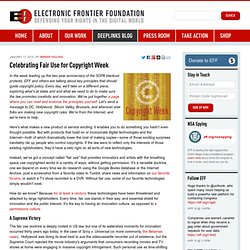
Every day, we'll take on a different piece, exploring what’s at stake and and what we need to do to make sure the law promotes creativity and innovation. We've put together a page where you can read and endorse the principles yourself. Let's send a message to DC, Hollywood, Silicon Valley, Brussels, and wherever else folks are making new copyright rules: We're from the Internet, and we're here to help. Here's what makes a new product or service exciting: it enables you to do something you hadn't even thought possible. But with products that build on or incorporate digital technologies and the Internet—both of which dramatically lower the cost of making copies—some of those exciting surprises inevitably rile up people who control copyrights.
How do we know? A Supreme Victory All This Cool Stuff Danger Ahead. FB: It's Day 5 of Copyright Week—time to... - Electronic Frontier Foundation (EFF) 13 january 2014 tpp copyright. Everything you need to know about Copyright Week. To the many who view themselves as netizens, citizens of the Internet, the loss of Aaron Swartz was a devastating moment in history.
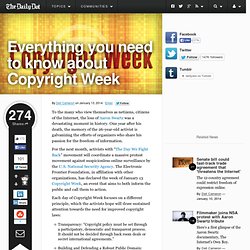
One year after his death, the memory of the 26-year-old activist is galvanizing the efforts of organizers who share his passion for the freedom of information. For the next month, activists with “The Day We Fight Back” movement will coordinate a massive protest movement against suspicionless online surveillance by the U.S. National Security Agency. Transparency Is Fundamental to Good Copyright Policy. In the week leading up the two-year anniversary of the SOPA blackout protests, EFF and others are talking about key principles that should guide copyright policy.
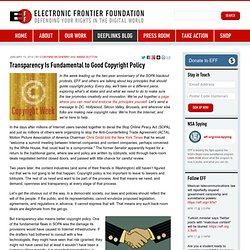
Every day, we'll take on a different piece, exploring what’s at stake and and what we need to do to make sure the law promotes creativity and innovation. We've put together a page where you can read and endorse the principles yourself. Let's send a message to DC, Hollywood, Silicon Valley, Brussels, and wherever else folks are making new copyright rules: We're from the Internet, and we're here to help. Two years later, the content industries (and some of their friends in Washington) still haven’t figured out that we’re not going to let that happen. Copyright policy is too important to leave to lawyers and lobbyists. Trans-Pacific Partnership. The Trans-Pacific Partnership (TPP) is a proposed regional regulatory and investment treaty.
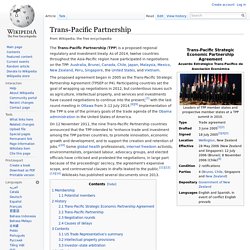
As of 2014[update], twelve countries throughout the Asia-Pacific region have participated in negotiations on the TPP: Australia, Brunei, Canada, Chile, Japan, Malaysia, Mexico, New Zealand, Peru, Singapore, the United States, and Vietnam. The proposed agreement began in 2005 as the Trans-Pacific Strategic Partnership Agreement (TPSEP or P4). Participating countries set the goal of wrapping up negotiations in 2012, but contentious issues such as agriculture, intellectual property, and services and investments have caused negotiations to continue into the present,[7] with the last round meeting in Ottawa from 3–12 July 2014.[8][9] Implementation of the TPP is one of the primary goals of the trade agenda of the Obama administration in the United States of America.
Membership[edit] There are twelve countries which are participating in negotiations for the Trans-Pacific partnership. History[edit] Stop Online Piracy Act. Proponents of the legislation said it would protect the intellectual-property market and corresponding industry, jobs and revenue, and was necessary to bolster enforcement of copyright laws, especially against foreign-owned and operated websites.
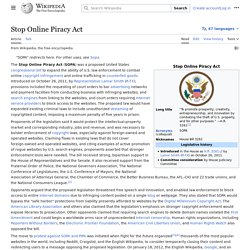
Claiming flaws in present laws that do not cover foreign-owned and operated websites, and citing examples of active promotion of rogue websites by U.S. search engines, proponents asserted that stronger enforcement tools were needed. Opponents claimed that the proposed legislation threatened free speech and innovation, and enabled law enforcement to block access to entire internet domains due to infringing content posted on a single blog or webpage. They expressed concerns that SOPA would bypass the "safe harbor" protections from liability presently afforded to websites by the Digital Millennium Copyright Act.
Overview[edit] The originally proposed bill would allow the U.S. On December 12, 2011 a revised version of the bill was tabled. Facebook, Transparency Is Fundamental to Good. NAFTA's Deplorable Legacy. NAFTA's Deplorable Legacy by Stephen Lendman Wall Street Journal columnist Mary O'Grady reinvents history.
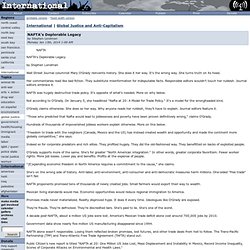
She does it her way. It's the wrong way. She turns truth on its head. Her commentaries read like bad fiction. NAFTA was hugely destructive trade policy. Not according to O'Grady. O'Grady claims otherwise. "Those who predicted that Nafta would lead to joblessness and poverty have been proven definitively wrong," claims O'Grady.
Hundreds of thousands of impoverished jobless workers explain otherwise.